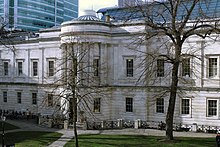Slade School of Fine Art
UCL Slade School of Fine Art (nieformalnie The Slade) – szkoła artystyczna przy University College London w Londynie.
Ma światową renomę[1] i znajduje się w rankingach najlepszych szkół graficznych w Wielkiej Brytanii. [2][3] Została założona w 1871 przez Felixa Slade'a. Obecnie w szkole pracują 52 osoby[4] i studiuje 320 studentów.[5] Dyrektorem szkoły jest Susan Collins.[6]
Kolekcja dzieł sztuki
Kolekcjonowanie dzieł sztuki przez szkołę zaczęło się, gdy zaczęto przyznawać nagrody dla najlepszych uczniów w 1897 roku, a prace, które zdobyły Summer Composition Prize and the Figure i Head Painting Prizes zaczęły być przez nią przechowywane. Prace studentów i pracowników Slade School of Fine Art stanowią dziś bazę dzieł znajdującą się w muzeum sztuki znajdującym się przy University College London.[7]
Przypisy
- ↑ Double first for Oxford - Times Online, 2 grudnia 2008 [dostęp 2018-05-12] [zarchiwizowane z adresu 2008-12-02].
- ↑ University guide 2013: league table for art and design, the Guardian, 22 maja 2012 [dostęp 2018-05-12] (ang.).
- ↑ University guide 2012: Art and design, the Guardian, 17 maja 2011 [dostęp 2018-05-12] (ang.).
- ↑ Academic Staff, www.ucl.ac.uk [dostęp 2018-05-12] (ang.).
- ↑ Slade School of Fine Art, www.ucl.ac.uk [dostęp 2018-05-12] (ang.).
- ↑ Prof Susan Collins - The Slade School of Fine Art, www.ucl.ac.uk [dostęp 2018-05-12] (ang.).
- ↑ UCL, UCL Art Museum, UCL CULTURE [dostęp 2018-05-12] (ang.).
Media użyte na tej stronie
Autor: UCL Mathematical and Physical Sciences from London, UK, Licencja: CC BY 2.0
The North Wing of the UCL Wilkins Building, home to the Slade School of Fine Art. This building was originally home to UCL's chemistry department, and housed the labs and offices in which William Ramsay carried out his research. Here, he discovered neon, argon, krypton and xenon, as well as isolating helium for the first time. He won the 1904 Nobel Prize in Chemistry. More elements were discovered in this building than in any other in the world. Photo credit: O. Usher (UCL)

